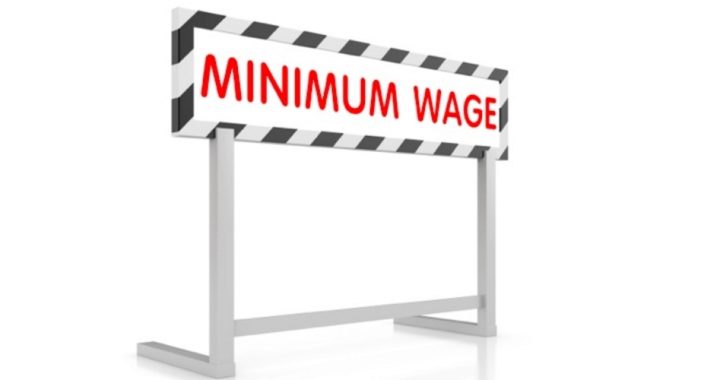
Threats by labor unions have forced California lawmakers to strike a deal this weekend that could increase minimum wage to $15 an hour, generating concerns from business owners that the deal will drive up their costs, force them to cut back on the number of employees, and even put them out of business. Despite fears over the long-term negative effects such a wage increase would have on businesses and the availability of jobs for low-skilled workers, lawmakers have apparently caved to union threats to launch fully funded political campaigns that would take the issue directly to the voters in November.
On Saturday, lawmakers and labor unions reached a tentative agreement that would increase statewide minimum wage to $10.50 per hour on January 1, 2017 and then gradually increase the wage in 50-cent and $1 increments until it until it reaches $15 an hour in 2022. The LA Times obtained a document that notes that businesses with less than 25 employees would be provided an extra year to comply, allowing them until 2023 to raise the minimum wage to $15 hourly.
While a tentative deal has been made, it is not likely to be finalized for another few weeks, as there remains a number of obstacles to be considered. The Times writes,
One is how to account for the patchwork of local ordinances — such as those scheduled to kick in for the city and county of Los Angeles — that already require a $15-an-hour minimum wage, or would get there faster than the statewide proposals. Business groups would like a Sacramento deal that considers some way to preempt or supersede the local laws.
Employers also oppose automatic cost-of-living increases. They want lawmakers to consider ways to freeze the statewide minimum wage during future recessions.
The deal appears to be the result of union strong-arming, with the labor unions threatening to take the issue directly to the voters via union-sponsored ballot initiatives. Two initiatives have been qualified for the November 8 ballot, and will only be pulled when a final agreement is reached.
“All of the polling that we’ve done shows that it would be highly likely to pass,” Steve Trossman of Service Employees International-United Healthcare Workers West said.
Up until 2014, state election law did not allow initiatives to be withdrawn from the ballot once voters’ signatures were submitted, but the law was revamped to allow lawmakers the opportunity to address the demands of the initiatives and therefore eliminate the need for the ballot initiative.
Lawmakers have until the end of June to finalize the deal, as the deadline to certify ballot propositions is June 30.
“We want to look at the details first,” said Trossman.
California Governor Jerry Brown, who had signed legislation in 2013 raising the minimum wage to $10 per hour by 2016, had opposed efforts to raise the minimum wage to $15 per hour by 2021. But he changed his position and announced the agreement. Before doing so, however, he had warned that such a wage hike would cost California an estimated $4 billion a year.
Business groups had no input, as they were reportedly “relegated to the sidelines during the negotiations,” the Times writes. But business owners have raised legitimate concerns regarding the wage hikes that have gone ignored by the major media.
One California business owner told the LA Times that increased minimum wage would force restaurants to raise its costs in order to remain operational. “First, you have to raise prices, otherwise you’ll be out of business,” said Selwyn Yosslowitz, president of the Marmalade Café, which runs numerous restaurants and an outlet at LAX Airport. “We will try to re-engineer the labor force. Maybe try to reduce the number of bus boys and ask servers to bus tables,” he added.
Yosslowitz also notes that the hike is likely to set up a “chain reaction” because employees already making $15 an hour will also demand a wage increase if minimum wage employees begin to make the same salary.
Sadly, Yosslowitz and other business owners are the unintended victims of the liberal agenda. Numerous findings reveal that minimum wage hikes do not achieve the desired effect of raising the poor out of poverty. In fact, they do the opposite, all while hurting businesses, the economy and the job market.
The Cato Institute’s Mark Wilson wrote in a 2012 report that wage increases result in higher costs for consumers and increased unemployment, ironically amongst the very groups that the minimum wage hikes aim to help.
Wilson wrote,
The main finding of economic theory and empirical research over the past 70 years is that minimum wage increases tend to reduce employment. The higher the minimum wage relative to competitive-market wage levels, the greater the employment loss that occurs. While minimum wages ostensibly aim to improve the economic well-being of the working poor, the disemployment effects of minimum wages have been found to fall disproportionately on the least skilled and on the most disadvantaged individuals, including the disabled, youth, lower-skilled workers, immigrants, and ethnic minorities.
Steve H. Hanke noted similar findings in his analysis of the impact of mandatory minimum wage in the European Union. Writing for the Cato Institute, he explained,
There are seven European Union (E.U.) countries in which no minimum wage is mandated (Austria, Cyprus, Denmark, Finland, Germany, Italy, and Sweden). If we compare the levels of unemployment in these countries with E.U. countries that impose a minimum wage, the results are clear. A minimum wage leads to higher levels of unemployment. In the 21 countries with a minimum wage, the average country has an unemployment rate of 11.8%. Whereas, the average unemployment rate in the seven countries without mandated minimum wages is about one third lower — at 7.9%.
In the United States, the minimum wage hikes are already resulting in employment reductions within the restaurant industry. The New American’s Clinton Alexander reported earlier this month that the increased minimum wages have prompted the fast food industry to take rapid steps toward automation, which ultimately involves replacing human workers with kiosks to save costs. Major players in the fast food industry, including McDonald’s, Hardees, Carl’s Jr., and Domino’s Pizza, are taking steps in this direction, proving once more that the push for minimum wage hikes are achieving numerous unintended negative consequences.
Alexander concluded, “When costs go up, companies must find ways to stay profitable…people must take a careful look at the price-tag that comes with pushing policies upon business and industry that raise employee wages beyond the value that employee provides.”
It seems the only people who win when the minimum wage is increased are union leaders and lawmakers who voted to approve the increase. Uninformed voters who believe they are benefiting from the increase won’t bite the hand that feeds them. Unfortunately, these voters are unaware that they’re being fed less than scraps. After all, those who lose their jobs as a result of minimum wage increases end up with a wage of zero.
Related articles:




